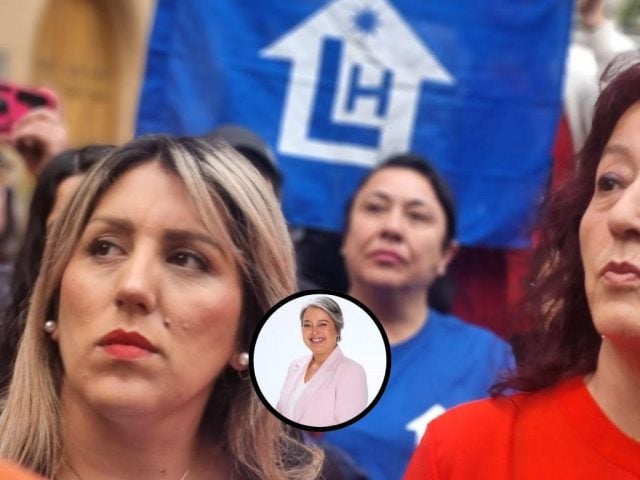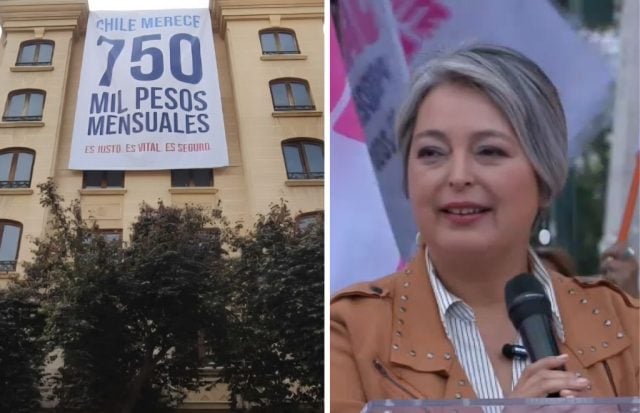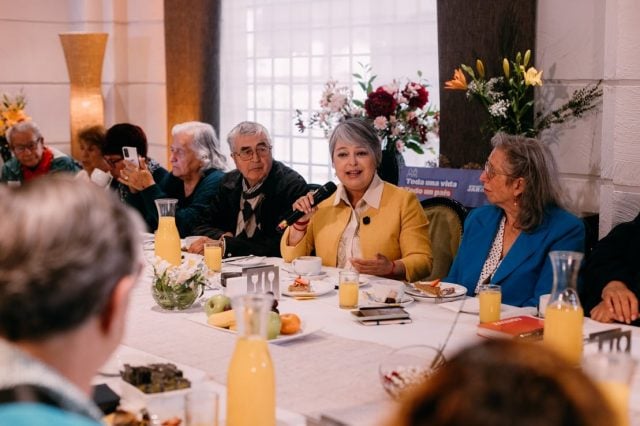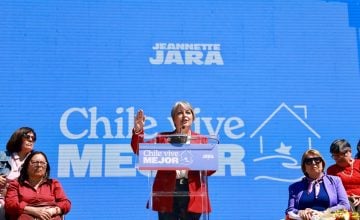Original article: Pobladores proponen a Jeannette Jara 260 mil viviendas para familias de bajos ingresos
Social organizations from various neighborhoods and settlements presented a series of housing development proposals to presidential candidate Jeannette Jara of Unidad por Chile on Monday. These initiatives advocate for the construction of 260,000 houses aimed at low-income families, emphasizing participatory decision-making processes.
The document, titled «Manifesto for a Chile with Dignified Housing and Safe Neighborhoods,» was crafted by leaders from housing committees, neighborhood councils, and community organizations. It outlines 11 key points designed to address the structural housing deficit in the nation.
«This proposal arises not from a desk but from the concrete experiences of hundreds of individuals who have learned through effort and organization how to lead their housing projects and empower their communities,» the authors noted.
The manifesto frames housing as the cornerstone of security, family life, and social stability, urging a shift towards creating housing and urban policies that prioritize common sense, community involvement, and long-term vision, where organizations actively participate in solutions rather than being passive observers.
National Housing and Neighborhoods Plan
In the first point of the manifesto, the community members suggested maintaining the Housing Emergency Plan, which aims to construct over 260,000 homes within four years, prioritizing families with the least resources.
They argued that access to housing should not be an endless wait, proposing that a «reasonable maximum delivery timeframe» be established to prevent bureaucratic delays that deny thousands their right to a dignified life.
This proposed number matches the target set by President Gabriel Boric’s government, which, through the Ministry of Housing and Urban Development (MINVU), has implemented the Housing Emergency Plan to deliver 260,000 homes during its term.
Furthermore, the organizations emphasized the need to ensure that promised resources are fully executed, with clear and transparent goals to guarantee just and effective budget allocation.
«Continuity of programs and fulfillment of promised figures must become state policy,» they asserted.
National Settlement Plan
In response to the growing number of informal settlements and the «deep despair due to evictions» in various regions, the manifesto demands «definitive housing solutions, the implementation of resettlement processes that create livable communities, with alternatives such as assisted self-construction to diversify housing access options» and calls for the «repeal of the Usurpation Law, which criminalizes poverty.»
Additionally, they urged for the promotion of effective community participation through Citizen Tables focused on Housing and Urban Development in each municipality and region.
Public Land Bank
One of the more innovative points in the manifesto suggests transforming the Land Bank from a simple administrator to an active participant that «intervenes and regulates land, protecting the common good against real estate speculation.»
This includes «the right to acquire private lands of public interest at fair prices» and a «national inventory of vacant or underutilized land,» which would involve «lands currently administered by the Armed Forces for proactive urban planning, supported by a perpetual Land Fund from MINVU and regional governments for financing acquisitions.»
«This proposal turns the city into a right,» they emphasized.
Community Leadership Training Program
The manifesto proposes a national training system whereby «every leader of a housing committee must complete a certified course with a final assessment,» coordinated by the MINVU’s Center for Studies along with public universities, institutes, and technical centers.
This program should include «state funding to cover training, transportation, child care services, and meals,» ensuring equitable access and strengthening democracy and efficiency in housing policies.
Safe Neighborhoods Plan
In the document addressed to Jara, community members stressed that for decades they have called for a policy to reclaim community spaces across the country, including squares, sports fields, neighborhood centers, and sidewalks in disrepair.
They argued that «security begins in the immediate surroundings, in a neighborhood equipped with lighting, green areas, sports facilities, cultural venues, and meeting spaces» and proposed an active integration strategy for organized neighbors to strengthen social fabric, enabling children’s and youth’s participation in the proactive design of these recovery spaces.
«An active, cared-for neighborhood with community presence is a safer neighborhood,» they noted.
Penalties for Illegal Sale of Housing Slots
One of the most assertive points in the document emphasizes the urgent need to «establish clear and effective legal penalties against those profiting from family necessity by selling slots or places in housing committees.»
The organizations propose that «fraudulent sale or mediation of housing slots be criminalized,» preventing those engaging in such practices from holding public office and «strengthening oversight and reporting mechanisms through the creation of new institutional channels.»
Safe and Quality Housing
The manifesto asserts that if Jeannette Jara reaches La Moneda, she guarantees that housing will meet high construction standards by modernizing the General Law of Urbanism and Constructions.
Additionally, it calls for updating regulations «to expedite the normative habilitation processes for land and incorporate new technologies, such as industrialized housing, ensuring suitable dimensions to meet families’ real needs.» It also emphasizes stimulating the construction of energy-efficient homes using «durable materials, good insulation, inclusive design, and environmentally friendly practices.»
This includes promoting adaptations for individuals on the autism spectrum and those with disabilities or other special conditions as part of the legal habitability requirements.
Social organizations urge that access to housing be facilitated, promoting self-managed production as a habitat through cooperatives and creating new supportive regulatory frameworks.
Housing Within City Limits
Another proposal highlights the need to introduce a super-location subsidy that considers land value, enabling families to live close to their support networks and opportunities, especially when applying to housing committees.
They clarified that «it’s not just about building homes, but allowing people to stay in their communities, near schools, health centers, and transport, leveraging public investment in infrastructure to halt gentrification.»
The ultimate aim is to guarantee «the right to the city and territorial justice,» they emphasized.
Participatory Coordination and Oversight
The text argues that enhancing coordination among various stakeholders—ministries, municipalities, SERVIU, and organized communities—will streamline processes and avoid delays.
Moreover, it stresses the importance of transparent oversight to provide responsible support «based on technical-social units, with municipal teams working alongside committees and the State, empowering them with more authorities and budgets in this regard.»
Defending the State’s Capacity to Invest in Housing
The manifesto also emphasizes the urgent need to restore and strengthen the investment capacity and annual budget of the Ministry of Housing and Urban Development in light of the current budget crisis.
For this reason, they urge Jara to consistently increase funding allocated for the construction of homes for the most vulnerable sectors and for the comprehensive improvement of the country’s most deteriorated neighborhoods.
National Table for Dignified Housing and Safe Neighborhoods
Lastly, the organizations propose the establishment of a permanent working table among communities, municipalities, public institutions, and private actors to coordinate actions and share best practices.
«Housing and urban solutions must be planned with people, not for them. Citizen participation and accountability should be central to all public housing policies. Only through dialogue and collaboration can we build trust and move towards a fairer, more habitable Chile for everyone,» the community members asserted.
In the text, they highlighted that the manifesto emerged from the organized voices of community members amid the most significant housing crisis Chile has faced in recent decades.
To ensure these demands become effective policies, they expressed to Jara the importance of creating a permanent working group with social leadership during her administration, «ensuring that participation is binding and sustained over the next four years.»
«We hope you commit to these dreams and demands. You have our determined and hopeful support to collaboratively build dignified housing, safe neighborhoods, and a fairer Chile. For a home, for a roof, housing is a right!» they concluded.
The organizations that endorsed the manifesto include:
Supporting organizations:
Los Sin Tierra Committees Association
Agrupación Luchadores y Luchadoras de Lo Hermida
Ukamau
Comite Ángel Luz Marina
Intercommunal Association of Social Housing RM
Brisas de Reñaca Alto
CCNA (Cerro Navia Solidarity Housing Coordinator)
Comité de Allegados El Pinar III
Comité de Allegados Futura Esperanza de La Reina
Comité de Llegado Nueva Esperanza
Comité de Seguridad Cantares
Comité de Vivienda Franklin Tramo 2
Comité de Vivienda Lumi Videla
Comité de Vivienda Memoria y Derecho
Comité de Vivienda Nueva Santa Emilia
Comité de Vivienda Nuestros Sueños, Nuestra Casa
Comité de Vivienda Patrimonio Santiago
Comité de Vivienda Por un Santiago Multicolor
Comité de Vivienda Quiero Mi Casa
Comité de Vivienda Rukawe Pelancura (Campamento Comunidad Los Conquistadores)
Comité de Vivienda Santiago Histórico
Comité de Vivienda Suyai
Comité de Vivienda Luchando por Nuestros Sueños de Talagante
Comité de Viviendas Grez León
Comité de Viviendas Sociales Barrio Franklin Tramo 3
Comité Despierta Barnechea
Comité Érika Martínez
Comité Familia Pachamama
Comité Orlando Millas
Comité para la Vivienda Mujeres Jefas de Hogar de Santiago
Comité Vecinos Unidos
Coordinadora Comité de Allegados San Ramón
Coordinadora Conchalí Norte Autónomo
Coordinadora de Allegados de Huechuraba
Coordinadora de Comités de Vivienda de Santiago Centro (CoCoViSan)
Coordinadora de Vivienda Cerro Navia Solidaria
Coordinadora Fuerza y Unión Puente Alto
Coordinadora Metropolitana Nacional de Pobladores
Defensoría de la Vivienda y el Buen Habitar
Gente de la Tierra CTA
Neighborhood Committee 145-B Reconstructing Placilla Oriente (Placilla de Peñuelas, Valparaíso)
Neighborhood Committee No. 30 Thompson
Neighborhood Committee Villa Ayquina, Sector Desco
Kimenche
Los Robles Unido
Barrancas Movement
Organized Populace Movement (MPO)
Fighting Residents and Population Movement (MPL-Chile)
Sustainable Movement
Sustainable National Housing Movement
Orlando Millas 2
Housing Committee Pachamama
Housing Committee Fuerza Lo Hermida
Pintana Solidaria
For the Right to Live in Peace
San Alfonso Santiago
Macul Housing Committee Association
Gladys Marín Allegados Association
Our Home, Our Right Allegados Association
United Voices
We Tripan Antu
You can read the full text below:










